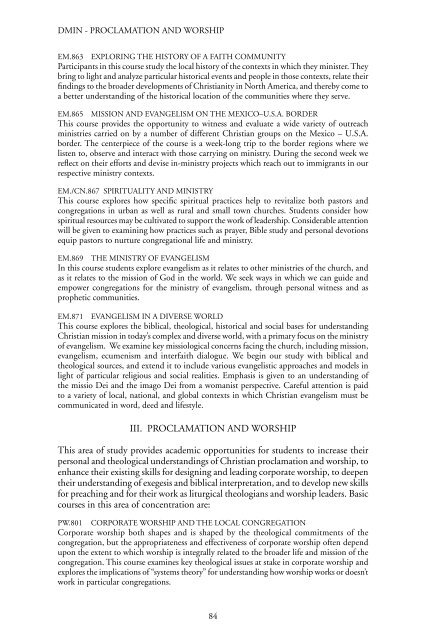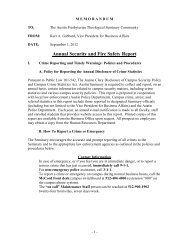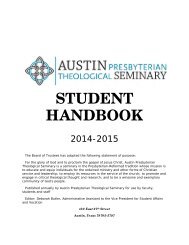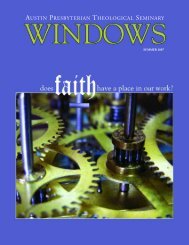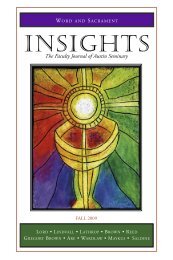Catalogue 2008 Book - Austin Presbyterian Theological Seminary
Catalogue 2008 Book - Austin Presbyterian Theological Seminary
Catalogue 2008 Book - Austin Presbyterian Theological Seminary
Create successful ePaper yourself
Turn your PDF publications into a flip-book with our unique Google optimized e-Paper software.
DMIN - PROCLAMATION AND WORSHIP<br />
EM.863 EXPLORING THE HISTORY OF A FAITH COMMUNITY<br />
Participants in this course study the local history of the contexts in which they minister. They<br />
bring to light and analyze particular historical events and people in those contexts, relate their<br />
fi ndings to the broader developments of Christianity in North America, and thereby come to<br />
a better understanding of the historical location of the communities where they serve.<br />
EM.865 MISSION AND EVANGELISM ON THE MEXICO–U.S.A. BORDER<br />
This course provides the opportunity to witness and evaluate a wide variety of outreach<br />
ministries carried on by a number of different Christian groups on the Mexico – U.S.A.<br />
border. The centerpiece of the course is a week-long trip to the border regions where we<br />
listen to, observe and interact with those carrying on ministry. During the second week we<br />
refl ect on their efforts and devise in-ministry projects which reach out to immigrants in our<br />
respective ministry contexts.<br />
EM./CN.867 SPIRITUALITY AND MINISTRY<br />
This course explores how specifi c spiritual practices help to revitalize both pastors and<br />
congregations in urban as well as rural and small town churches. Students consider how<br />
spiritual resources may be cultivated to support the work of leadership. Considerable attention<br />
will be given to examining how practices such as prayer, Bible study and personal devotions<br />
equip pastors to nurture congregational life and ministry.<br />
EM.869 THE MINISTRY OF EVANGELISM<br />
In this course students explore evangelism as it relates to other ministries of the church, and<br />
as it relates to the mission of God in the world. We seek ways in which we can guide and<br />
empower congregations for the ministry of evangelism, through personal witness and as<br />
prophetic communities.<br />
EM.871 EVANGELISM IN A DIVERSE WORLD<br />
This course explores the biblical, theological, historical and social bases for understanding<br />
Christian mission in today’s complex and diverse world, with a primary focus on the ministry<br />
of evangelism. We examine key missiological concerns facing the church, including mission,<br />
evangelism, ecumenism and interfaith dialogue. We begin our study with biblical and<br />
theological sources, and extend it to include various evangelistic approaches and models in<br />
light of particular religious and social realities. Emphasis is given to an understanding of<br />
the missio Dei and the imago Dei from a womanist perspective. Careful attention is paid<br />
to a variety of local, national, and global contexts in which Christian evangelism must be<br />
communicated in word, deed and lifestyle.<br />
III. PROCLAMATION AND WORSHIP<br />
This area of study provides academic opportunities for students to increase their<br />
personal and theological understandings of Christian proclamation and worship, to<br />
enhance their existing skills for designing and leading corporate worship, to deepen<br />
their understanding of exegesis and biblical interpretation, and to develop new skills<br />
for preaching and for their work as liturgical theologians and worship leaders. Basic<br />
courses in this area of concentration are:<br />
PW.801 CORPORATE WORSHIP AND THE LOCAL CONGREGATION<br />
Corporate worship both shapes and is shaped by the theological commitments of the<br />
congregation, but the appropriateness and effectiveness of corporate worship often depend<br />
upon the extent to which worship is integrally related to the broader life and mission of the<br />
congregation. This course examines key theological issues at stake in corporate worship and<br />
explores the implications of “systems theory” for understanding how worship works or doesn’t<br />
work in particular congregations.<br />
84


